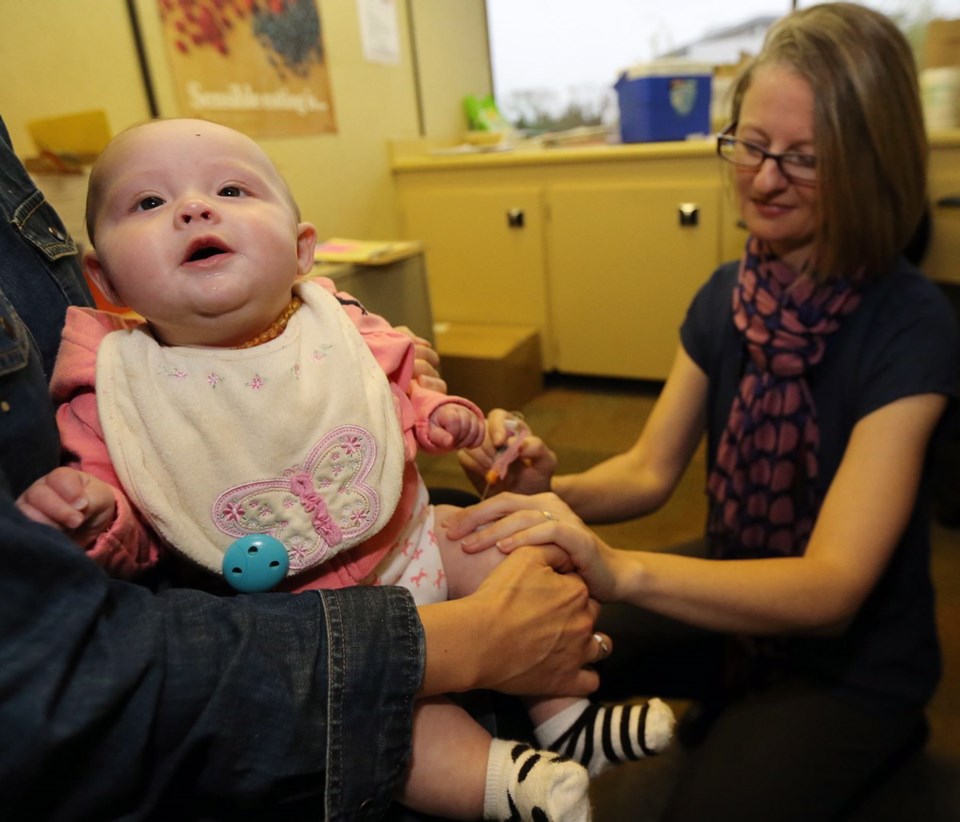Saanich public health nurse Carly Westwood has seen all kinds of parents when it comes to childhood vaccinations: at-ease, nervous, protective, even reluctant.
“Often parents will come in together, especially for the first time, and maybe Dad will hold the child,” said Westwood. “Sometimes it’s the mom, and Dad wants nothing to do with the immunization.”
To put them at ease, she said, the immunization is preceded by an assessment of the child’s health and condition. Parents are also offered information and encouraged to ask questions.
“We reassure them,” Westwood said. “We tell them they are not only protecting their own children but other members of the community, as well.”
Flu season, from late November through the winter, is quickly approaching and public immunizations are available for healthy children beginning at six months of age.
Also, all children in B.C. should be immunized for as many as 15 diseases by age four, when they start kindergarten and come into contact with other children.
However, vaccination rates on Vancouver Island have been inching downward in recent years.
Dr. Dee Hoyano, medical health officer for Island Health, said in 2012 only 68 per cent of Island two-year-olds had up-to-date vaccinations. That’s down from 2008 when 75 per cent of children on Vancouver Island were vaccinated.
It’s a small decrease but it concerns public health doctors since 75 per cent is the generally agreed rate at which full-herd immunity is acheived.
This is the level of immunity necessary in a community to disrupt the infection of contagious diseases, enough so that even individuals without immunity can be considered protected.
“We do know our vaccination rates are slipping over the past decade, which is worrisome,” Hoyano said.
She couldn’t give a particular reason for the drop, but listed common parental concerns over vaccines by classifying them under two questions:
• Does my child really need this?
• How safe is it for my child?
As to whether a child needs to be vaccinated, Hoyano said even what were once routine childhood diseases, such as measles, can come with serious complications and consequences, even death.
Those complications are most likely to occur when a child is young and their immune responses are not fully functioning.
“The younger your child is, the more vulnerable they are to becoming very ill from the diseases we are trying to prevent,” she said.
“So by not vaccinating them, you are not protecting them when they need to be protected the most.”
As to whether vaccines are safe, Hoyano said they have all undergone testing. Furthermore, the results of widespread vaccination efforts are monitored constantly.
“Your child’s immune system is equipped to respond to the vaccine,” she said. “It’s not going to damage the child or his or her immune system and it will protect them.”
Also, recent reports linking vaccines with conditions such as autism or autoimmune disorders such as multiple sclerosis, have been examined and shown to be without merit.
Hoyano said she has also heard some people argue a natural immunity, derived from a genuine infection, is somehow better than one from a vaccine.
She has several issues with that reasoning, beginning with the fact that a genuine infection is simply less safe than a vaccine. Infection comes with all the potential complications immunization is attempting to avoid.
Furthermore, courting infection violates the personal, moral impulse behind herd immunity. By vaccinating yourself and members of your family, you are helping to protect other members of your community.
For example, rubella, sometimes called German measles, is relatively harmless for children, sometimes frequently passing unnoticed.
But if a pregnant woman catches rubella, the result can be miscarriage or serious birth defects, including blindness, deafness or heart problems.
Anti-rubella is part of the vaccine regime, delivered at 12 months and four years of age. It’s as much about protecting pregnant women and the children they are carrying as it is about the children being immunized.
“There is a herd immunity,” said Hoyano. “You are trying to protect other people by being vaccinated.”
Finally, she said she dislikes the notion parents need to be made to feel guilty about vaccines. Also, they should not worry about the safety of the vaccine regime.
“No parent should feel guilty that they are taking steps to protect their children, doing everything they can to keep them healthy,” Hoyano said.
“They should feel confident and proud in taking those steps to keep their children safe through vaccination.”
For more information about vaccines and immunization programs, go to immunizebc.ca.



